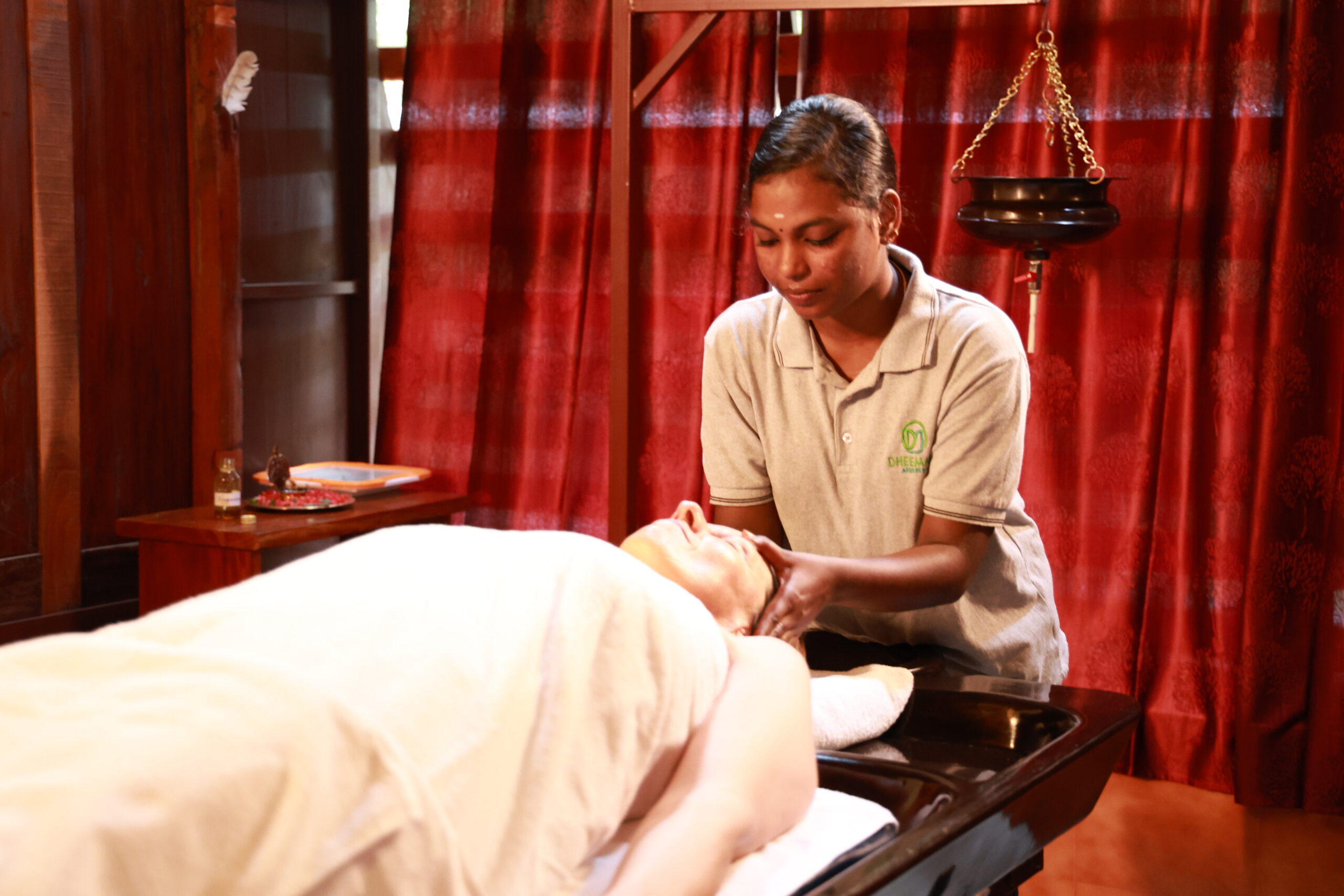How to Prevent Migraines Through Ayurveda?
Dr. Amritha B.A.M.S
Migraine is a neurological condition characterized by intense, debilitating headaches often accompanied by other symptoms such as nausea, sensitivity to light and sound, and visual disturbances.
Symptoms of Migraine:
Headache: Typically throbbing or pulsating, often on one side of the head.
Sensitivity: Increased sensitivity to light, sound, and sometimes smell and touch.
Nausea and vomiting: Common during a migraine attack.
Visual disturbances: Known as aura, it includes flashes of light, blind spots, or zigzag lines.
Ways to prevent migraines
Migraines can be debilitating, but there are proactive steps you can take to prevent their onset or reduce their frequency and severity.
Identify and Avoid Triggers:
Understanding your triggers is crucial for preventing migraines. Common triggers include certain foods (like aged cheeses, processed foods, and artificial sweeteners), hormonal changes, stress, lack of sleep, and sensory stimuli (bright lights, strong smells). Keep a migraine diary to track potential triggers and patterns.
Maintain a Consistent Sleep Schedule:
Quality sleep is essential for overall health and migraine prevention. Aim for 7-9 hours of sleep each night and establish a regular sleep routine. Avoiding oversleeping on weekends or inconsistent sleep patterns can also help.
Manage Stress Effectively:
Stress is a significant trigger for migraines—practice relaxation techniques such as deep breathing, meditation, yoga, or progressive muscle relaxation. Regular exercise is also beneficial for reducing stress levels.
Stay Hydrated:
Dehydration can trigger migraines in some individuals. Drink plenty of water throughout the day, and limit alcohol and caffeine consumption, as these can contribute to dehydration and trigger migraines.
Eat a Balanced Diet:
Maintain regular meal times and avoid skipping meals, as low blood sugar levels can trigger migraines. Incorporate whole foods rich in magnesium, such as nuts, seeds, whole grains, and leafy greens, as magnesium deficiency has been linked to migraines.
Exercise Regularly:
Engage in moderate aerobic exercise such as walking, swimming, or cycling for at least 30 minutes most days of the week. Exercise releases endorphins, which can help reduce stress and potentially prevent migraines.
Limit Caffeine and Alcohol:
While small amounts of caffeine can sometimes relieve migraine symptoms, excessive consumption can trigger migraines in susceptible individuals. Similarly, alcohol, especially red wine and beer, can trigger migraines in some people.
Consider Supplements and Herbs:
Certain supplements and herbs have shown promise in migraine prevention, such as magnesium, riboflavin (vitamin B2). However, always consult your healthcare provider before starting any new supplement regimen.
Maintain a Healthy Weight:
Obesity has been linked to an increased risk of migraines. Aim to maintain a healthy weight through a balanced diet and regular exercise, as weight loss may help reduce the frequency and severity of migraines.
Explore Relaxation Therapies:
Relaxation techniques teach you to control physiological responses that may trigger migraines, such as muscle tension and changes in skin temperature. These techniques can be effective when practised regularly.
Ayurvedic Way of Cureing Migraine
According to Ayurveda, migraines are often classified under the category of “Shiroroga” (head disorders). It attributes the onset of migraines to the aggravation of specific doshas—particularly Vata and Pitta doshas—due to various factors such as improper diet, stress, erratic lifestyle, and environmental factors.
Principles of Ayurvedic Treatment:
Identifying Dosha Imbalance: A personalized approach is crucial in Ayurveda. The doctor will assess your dosha imbalance through a detailed history, pulse diagnosis (Nadi Pariksha), and examination of the tongue and eyes.
Balancing Doshas: Treatment focuses on restoring the balance of aggravated doshas. For Vata-predominant migraines, therapies that calm the nervous system are recommended. For Pitta-related migraines, cooling therapies to reduce heat in the body are utilised.
Detoxification (Panchakarma): Panchakarma therapies, such as Nasya (nasal administration of medicated oils), can help eliminate toxins (ama) and reduce dosha imbalances contributing to migraines.
Ayurvedic Therapies for Migraine:
Shirodhara: Continuous pouring of warm herbal oil over the forehead to calm the mind.
Abhyanga: Therapeutic oil massage to promote relaxation and improve circulation.
Swedana: Herbal steam therapy to detoxify and relax the body.
Dietary Recommendations: Ayurveda emphasizes a balanced diet tailored to your dosha type. It generally recommends avoiding spicy, oily, and processed foods for migraine prevention. Instead, favouring fresh fruits and vegetables, whole grains, and warm, cooked meals is beneficial.
Lifestyle Modifications: Maintaining a regular daily routine (dinacharya), practising yoga and pranayama (breathing exercises), and ensuring adequate rest and sleep are integral to Ayurvedic migraine management.
Mind-Body Practices:
Ayurveda also emphasises the importance of mental well-being in managing migraines. Meditation, mindfulness, and specific yoga asanas (postures) can help reduce stress and balance the mind-body connection.
Migraine Treatment at Dheemahi
Dheemahi Ayurveda – one of the best ayurveda resort in kerala boasts a team of expert doctors who bring knowledge and experience to the forefront. Rooted in traditional Ayurvedic practices, these experts integrate ancient wisdom with modern medical understanding, creating a dynamic and practical approach to patient care.
At Dheemahi Ayurveda, we understand that holistic healthcare requires ongoing attention. That’s why we highly value regular consultations and follow-up check-ups.
This commitment ensures that you, our patient, receive continuous support, with our doctors diligently monitoring your progress and making necessary adjustments to your treatment plans as needed.
At Dheemahi Ayurveda, we believe in going beyond treating symptoms. We acknowledge the interconnectedness of mental and physical well-being.
Our emphasis on the mind’s role in achieving a healthy life reflects a holistic understanding of health, where your mental and emotional balance is considered integral to your overall wellness.
We value your mental health as much as your physical health.
Dheemahi Ayurveda’s unique strength lies in its ability to combine the knowledge of the past five generations with contemporary healthcare practices.
Transparency and accountability are key pillars of Dheemahi Ayurveda’s healthcare process.
Documenting treatment schedules provides patients with a clear understanding of their therapeutic journey, fostering trust and confidence in the authenticity and effectiveness of Migraine Ayurvedic treatments.
How Our Booking Process Works
The unique approach involves a series of discussion during your initial decision-making process to make sure that we will be able to match your expectations with our treatment.
Based on the discussions with you our team of expert doctors will design the best treatment package personalized for your needs.
01
Consultation Form
Fill out our consultation form, and let us know when will you be available for our doctor to talk to you
02
Discussion with Doctor
Discuss your health condition and expectations with our doctor.
03
Booking Confirmation
Confirm the booking by making a payment of 50% advance.
Consultation Form
Submit this form to initiate a booking with us
Have any queries? We will help you. Talk to us now
Say Goodbye to Health Woes & Hello to Healthy Living
Dheemahi Ayurvedic Pvt Ltd
12/386 Varaputhara Road
Kumarakom, Kerala, India
Pin 686563
Dheemahi Ayurvedic Centre, Near Neelimangalam Bridge, Kumaranaloor, Perumbaikad.P.O, Kottayam, Kerala, India, Pin 686016
Other Treatments
Best Ayurveda Hospital in Kerala | Best Ayurveda Retreat in Kerala | Everything about Panchakarma Treatment in Kerala | Can Panchakarma cure slip disc? | Ayurvedic Treatment Packages in kerala | Best Ayurvedic Centre in Kerala | Karkidaka Chikilsa | Ayurvedic Treatment for Depression | How to Reduce Stress Naturally | Dietary and Lifestyle Recommendations for Weight Loss | Autoimmune Disorders


